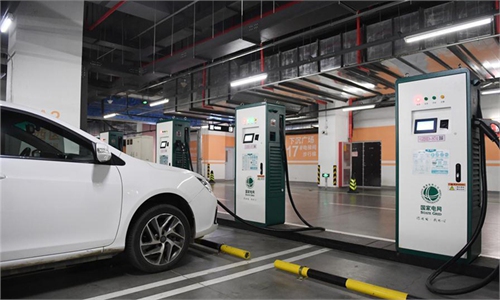Chinese lithium market fluctuates following news of unveiling deposit in Afghanistan

A worker at a lithium battery factory in Huzhou, East China's Zhejiang Province Photo: cnsphoto
After months of soaring stock markets in China, the historic fall of lithium shares on A-shares markets this Wednesday sent a mixed message to the industry about the potential change in the world supply chain make-up after Afghanistan, where the world's largest lithium deposits are located, appeared to flag potential international cooperation after 20 years of instability and stagnation.
Industry insiders believe the stock market reaction on Wednesday was partially to do with the unveiling potential for the country's natural resource reserves, a potential circuit-breaker to end the tight supply of lithium over recent years.
Lithium stock reacted negatively on Wednesday, with several industry players including Ganfeng Lithium and Tianqi Lithium falling by their daily limits, with several firms connected to the industry also stumbling.
While Tianqi Lithium refused to comment on its stock price tumble, industry experts said a potential large untapped lithium supply in Afghanistan may alter the competitive landscape.
If the situation in Afghanistan can be stabilized, the country's vast lithium reserves will become commercialized, which would help to ease the current tightened lithium supplies, experts said.
The stock market drop on Wednesday is connected to the prospect of the future exploitation of the world largest lithium deposit in Afghanistan, Wang Guoqing, research director at the Beijing Lange Steel Information Research Center, told the told the Global Times on Wednesday.
"At present, the Taliban are actively seeking the help of other countries to stabilize the economy. One cannot rule out that they will develop this lithium resource in the future," said Wang.
The second half of 2021 has seen the most constrained supply of lithium in recent years.
Viewed from a supply side, Australia's supply of lithium concentrate accounts for about 46 percent of global supply, there is no other way to replace the country's dominant position in the short term.
China accounts for nearly half of global lithium consumption, about 70 percent which relies on imports of, of which about half comes from Australia, pushing up the price and exposing Chinese firms to supply chain volatility.
The demand for lithium electricity increases by about 50 percent in the first half of the year, and there is no increment in the supply side, a report with Guotai Junan Securities said.
In late August, the Taliban learned that there is a world-class lithium mine with an economic value of up to one trillion dollars, according to media reports.
Zhou Shijian, a former vice president of the China Chamber of Commerce of Metals, Minerals & Chemicals Importers and Exporters, also agreed that the stock market fluctuation on Wednesday is likely to do with what happened in Afghanistan.
But the expert said that given the current situation in Afghanistan is still not clear, its near-term impact on the lithium industry remains unknown.

